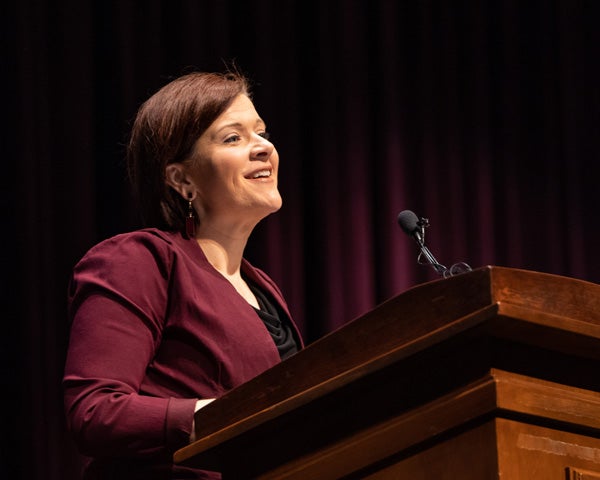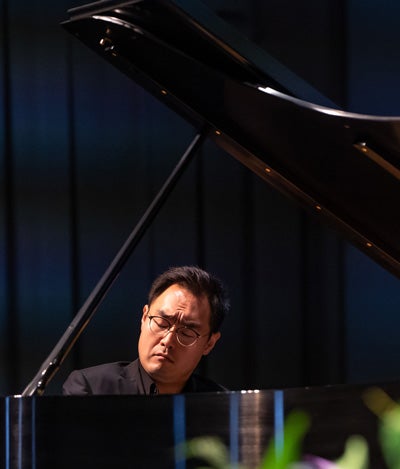PASSION AND IMPACT
Faculty convocation marks beginning of new Pirate journey
East Carolina University’s faculty gathered in Wright Auditorium Friday morning for convocation, a ceremony marking the official start of the 2018-2019 school year.

Dr. Jami Rhodes of the ECU School of Music spoke as the recipient of the 2018 Board of Governors Award for Excellence in Teaching.
Kwan Yi, assistant professor of piano in the ECU School of Music, kicked off the event with a performance of Frédéric Chopin’s Ballade No. 3 in A-flat major, Op. 47.
Chancellor Cecil Staton highlighted a few of the many accomplishments of the university’s faculty over the past year, as well as those of its students. He welcomed Dr. Anisa S. Zvonkovic, the new dean of the College of Health and Human Performance, as well as approximately 140 new members of the faculty.
Among those recognized were Dr. Michelle Skipper, who received the Governor’s Award for Public Service last November, and Dr. Margaret Bauer, who received the state’s top civilian honor, the North Carolina Award, from Governor Roy Cooper. Dr. Greg Chadwick was also noted for his public service, which resulted in his receiving the Gov. James E. Holshouser Jr. Award from the UNC System Board of Governors.
Students recognized by name included Fei Gao, Tyler Beasley, Emory Saia and Gabriel Beattie-Sergio.
“These students are just a few examples of the undaunted spirit of our 29,000 students who inspire me — and, I’m sure, you — each and every day,” Staton said.
Staton updated the faculty on several key initiatives, noting progress in research — including an increase in the number of research proposals and an improved funding rate for proposals funded through the National Science Foundaion — and in internationalization. There were 201 students at ECU on student visas last year, up from 187 the year prior. More than 700 ECU students participated in study abroad programs, up from 586 the previous year, collectively visiting 31 countries.
Staton also pointed out that ECU’s five-year graduation rate is now 60 percent, a marked improvement from a rate of 49.5 percent in 2002, and noted that the university’s $500 million comprehensive campaign continues to do well, with $190 million in pledges, gifts and commitments as of June 30.

Kwan Yi of the ECU School of Music performed a piece by Frédéric Chopin to begin the ceremony.
Enrollment for 2018-2019 is down slightly from the previous year, which Staton said is the result of a combination of challenges, including a highly competitive environment for recruitment at a time when the population of college-bound students is flat. New recruiting efforts and the recently announced co-admission program with area community colleges are two ways the university is working to overcome those challenges, he said.
Dr. Jeff Popke, chair of the faculty, introduced two faculty members who were invited to speak at convocation as the recipients of major awards in the areas of teaching and research. Dr. Jami Rhodes, associate professor of voice in the ECU School of Music, received the 2018 Board of Governors Award for Excellence in Teaching last spring. She spoke of the importance and impact of teachers.
“Our students come from every walk of life, and like me when I walked on this campus 21 years ago as an ECU freshman, these students don’t have any clue — nor do we — where this education that they’re about to begin is going to take them,” she said. “Albert Einstein said, ‘I have no special talents. I am only passionately curious.’ Which is an idea that I absolutely love.
“When I look back over my own training, I was taught a lot of things. But the things I actually learned were the things I was curious about. And often that curiousity was planted, like a seed, by a teacher.”
Rhodes also said she envies today’s students for the technology they have and what it means for the availability of information.
“I’m jealous of them because they are growing up in a time where advances in technology and science and our understanding of physiology and anatomy are putting us in a place where there’s a beautiful marriage between the arts, which is the world that I live in, and the sciences in a way that’s never really been possible before,” she said.
By 2030, she said, people over the age of 65 will make up 25 percent of all drivers.

Chancellor Cecil Staton and Dr. Jeff Popke, chair of the faculty, listen as Dr. Anne Dickerson describes her research on aging drivers.
“My passion as an occupational therapist, a researcher and a teacher has largely focused on how I can help therapists, including future therapists, be prepared to meet the needs of older adults wanting to age in place, and more specifically, how are they going to participate in their community beyond their front door?” she said.
Dickerson’s research examines how driving ability can be quantified as people age, as well as how to help them remain involved in the community once they can no longer drive.
“For the older adult, it’s not just about getting where you need and want to go,” she said. “Sometimes it’s just about the car and what it represents.”
Popke described his recent visit to the island of Dominica, which was heavily impacted by the Category 5 Hurricane Maria last year. He outlined four principles for resilience that he said could be seen on the island, but that could also be applied to facing the challenges in higher education.
“Fairness, participation, inclusiveness and embeddedness,” he said. “Principles for resilience, whether in post-hurricane Dominica or here at ECU, as we navigate through a time of change. I believe that we will navigate successfully if we continue to work across all campus constituencies in a spirit of partnership and collaboration. I look forward to working together with all of you in the year ahead to continue to move ECU forward and to help maximize our positive impact on our students and our region.”
Staton pledged to continue his advocacy for ECU and its faculty and students.
“I want to thank you for making this your life’s work,” he said. “You truly make a difference in the lives of our students and in the ongoing legacy of this institution.”
